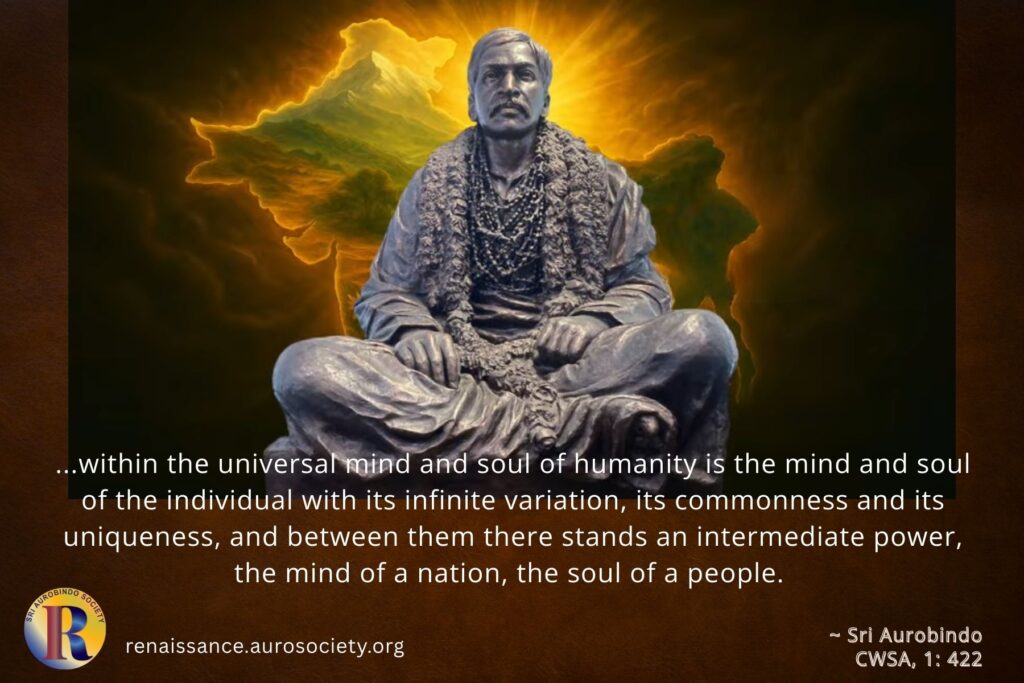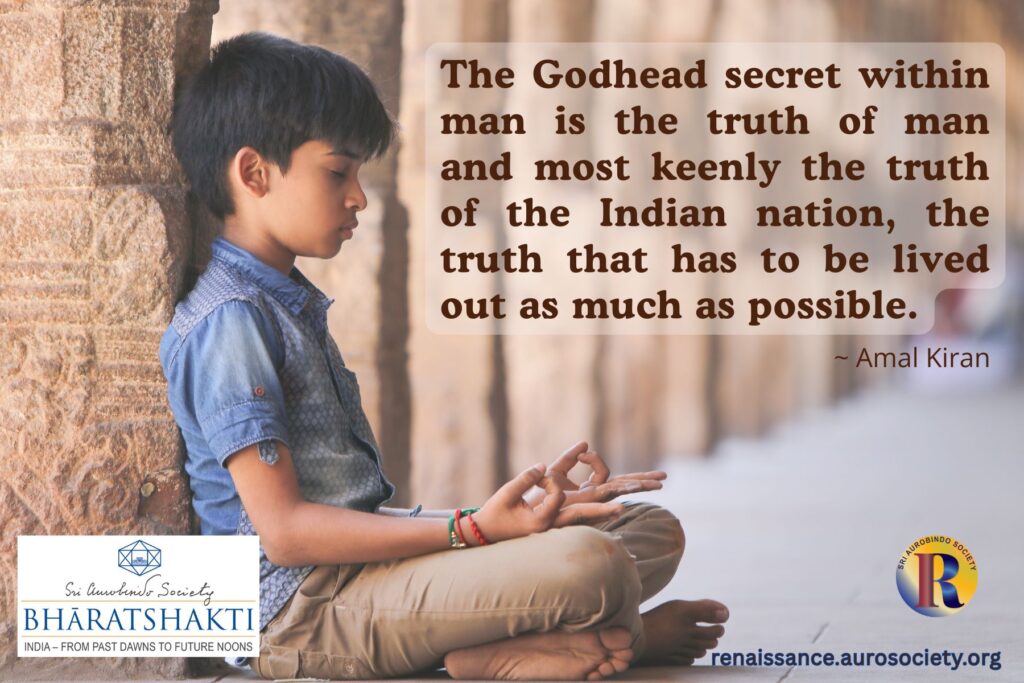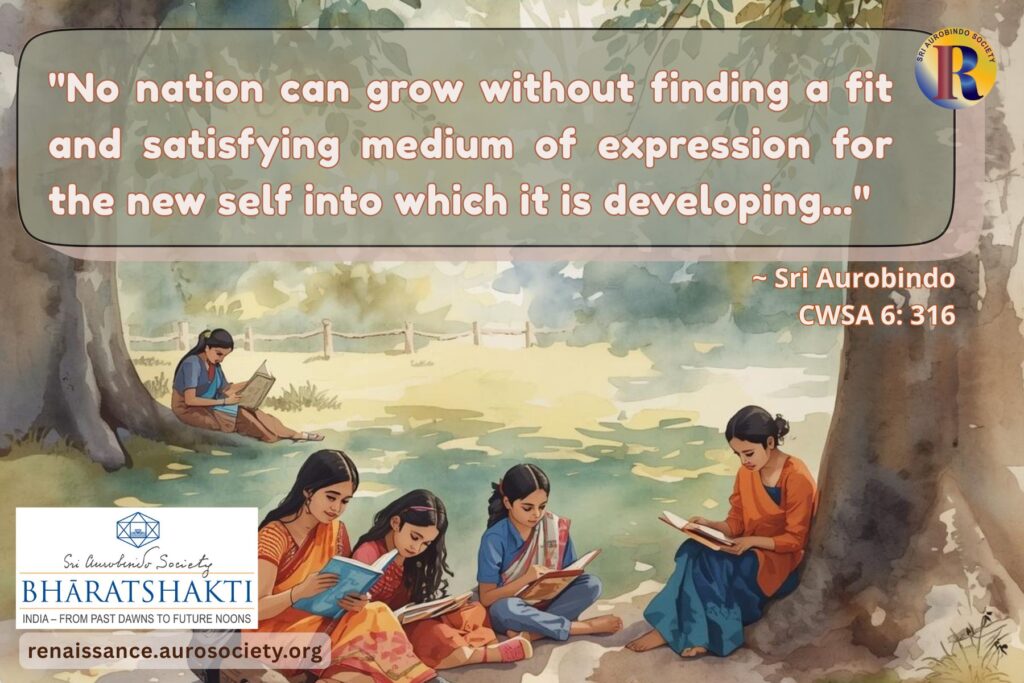Volume VI, Issue 5
Author: Nanda Kishor M.S.
Editor’s Note: On April 15, 2025, a book launch and discussion event was organised at Pondicherry for Dr. Beloo Mehra’s latest book titled Antaryatra: Soul Journeys. Dr. Nanda Kishor M. S., Chair of Sri Aurobindo Studies and Head, Department of Politics and International Relations, Pondicherry University, was the guest of honour at the event. He also presented a detailed review of the book. Read the full review and also watch a video recording of his presentation.
From the back cover of the book
Antaryatra: Soul Journeys is a renewed quest for the meaning of India, Bharat Shakti, viewed through the eyes of a youth named Yuvaan. It is also a Bharat Darshan in geographical and spiritual sense, reminding us of the immortal tales of Sister Nivedita. Skirting the easy option of self-help books and new age spirituality for the backpackers, author Beloo Mehra firmly bases herself on the vision of Sri Aurobindo for a new Renaissance in India. As Yuvaan travels through the myriad sites of this haloed land: Ganges, Haridwar, Ajanta, Ellora, Modhera, Somnath, Dwarka, Pondicherry and many others, he realizes, as Sri Aurobindo explains, that “the spiritual force not only creates the future, but creates the material for the future.”
Aimed primarily at the youth of India, the book urges us to go beyond the current pursuit of money and power; it is a remarkable tour de force, a timely reminder to the awakened youth of India to build the nation of the future.
Prof. Sachidananda Mohanty
Member, University Grants Commission
Ministry of Education, Government of India

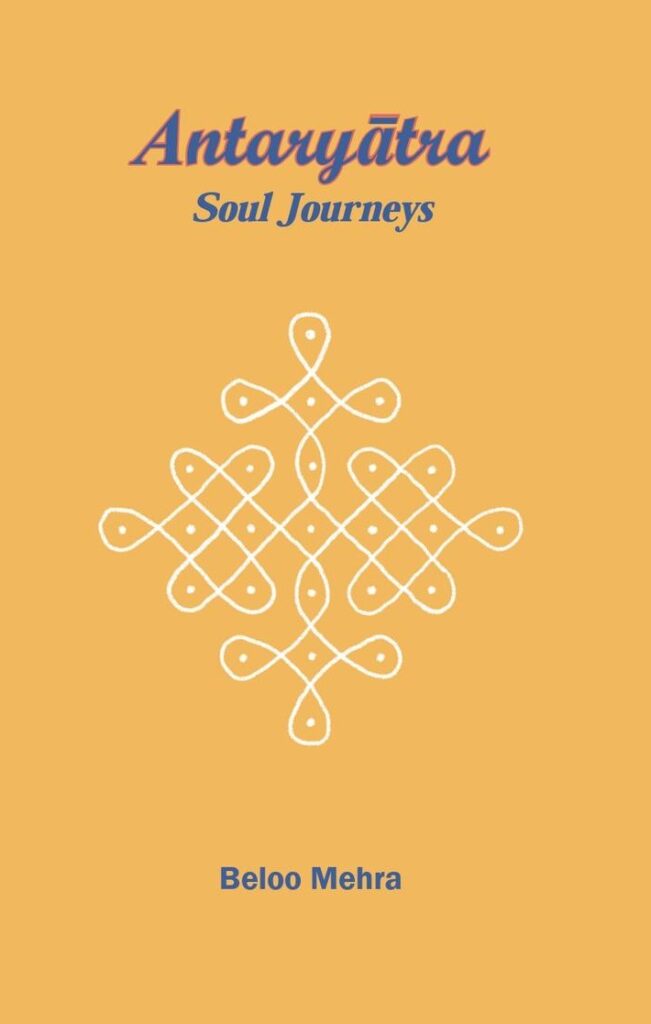
Sri Aurobindo’s Action (with Brown Critique Books)
ISBN: 978-93-84216-18-4
Review by Dr. Nanda Kishor M. S.
Dr. Beloo Mehra’s Antaryatra: Soul Journeys is an evocative, introspective, and spiritually rooted work that reflects the author’s deep engagement with the inner journey of self-discovery, transformation, and integral living. Set against the backdrop of Sri Aurobindo’s and the Mother’s teachings, the book transcends the boundaries of mere autobiographical narrative. Instead, it takes the form of a reflective memoir, philosophical musing, and inner dialogue that invites the reader to look within, to embark on their own antaryatra — the inner Journey.
Dr. Mehra, a scholar, educator, and practitioner of Integral Education, brings to this work her years of spiritual sadhana, academic exploration. and personal introspection. Antaryatra: Soul Journeys is not just a chronicle of her external experiences or accomplishments; rather, it is a soul’s sincere attempt to trace the arc of growth, conflict, resolution, and surrender in its quest for the Divine.
The book is a luminous offering that blends spiritual introspection, national identity, and philosophical inquiry in a narrative designed to inspire India’s youth and rekindle in them a deeper understanding of their civilizational roots. Published by Sri Aurobindo’s Action and Brown Critique Books, the text is structured around the inward and outward journeys of a fictional character, Yuvaan — a name that itself signifies youthful spirit and awakening.
The structure of Antaryatra reflects the very nature of the spiritual path. It is not linear, but cyclical, spiraling inward and upward. The book does not follow a strict chronological narrative but rather unfolds in layers. Each chapter reads like a meditation, offering glimpses into various stages of the protagonist’s inner development. in fact, the book feels less like a traditional memoir and more like a spiritual sadhak’s journal, one that blends experience with insight, emotion with wisdom, and action with contemplation.
Watch the Review
More of the Review
A significant strength of Antaryatra is its rooted-ness in the spiritual philosophy of Sri Aurobindo and the Mother. Dr. Mehra’s authorial voice never imposes these teachings on the reader; rather, she allows Yuvaan’s evolving experience to be a living testimony to the transformative power of their vision. Passages inspired by Sri Aurobindo’s writings or the Mother’s letters do not appear as quotations for ornamentation but as organic extensions of the author’s thoughts as expressed through Yuvaan’s ongoing quest. In doing so, she succeeds in embodying the Integral Yoga rather than merely theorizing about it.
This embodiment is most evident in the way the author speaks about her evolution as a teacher, writer, and community member. The challenges she faces are not avoided ; instead, they are embraced as opportunities for growth. Whether it is her departure from academia, her inner resistance to societal expectations, or her search for deeper meaning in work and relationships, each situation becomes a crucible for inner purification and strength-building. Her insights into education, especially from the perspective of Integral Education, add another layer of richness to the book, making it relevant not just for spiritual seekers but also for educators and community leaders.
Subtle Commentary
Stylistically, Antaryatra is gentle, contemplative, and poetic in places. Dr. Mehra’s prose is lucid but layered, often inviting the reader to pause, reflect, and absorb. The language is not flashy or rhetorical, but suffused with sincerity. This matches the book’s subject matter: the journey within
cannot be narrated with flamboyance; it demands an economy of words, a purity of expression, and a rhythm of silence between thoughts—and Antaryatra achieves this rare literary and spiritual balance.
The book also serves as a subtle commentary on modernity’s excesses. In an age marked by constant outward engagement, rapid technological change, and an increasing detachment from inner life, Dr. Mehra’s work reminds us of the importance of silence, solitude, and surrender. Without ever sounding preachy, she draws attention to the inner void that many feel despite outer achievements, —and offers the inner journey as the only authentic way to fill it.
At one level, Antaryatra is a travelogue. Yuvaan embarks on a journey across the cultural and spiritual landscape of India, from the ghats of Varanasi to the temples of Somnath, from Haridwar to Puducherry. However, the deeper resonance of the book lies not in the physical movement across sacred geographies, but in the transformative inner journey Yuvaan undergoes — a journey that mirrors the soul-searching essential for the revival of India’s true identity.
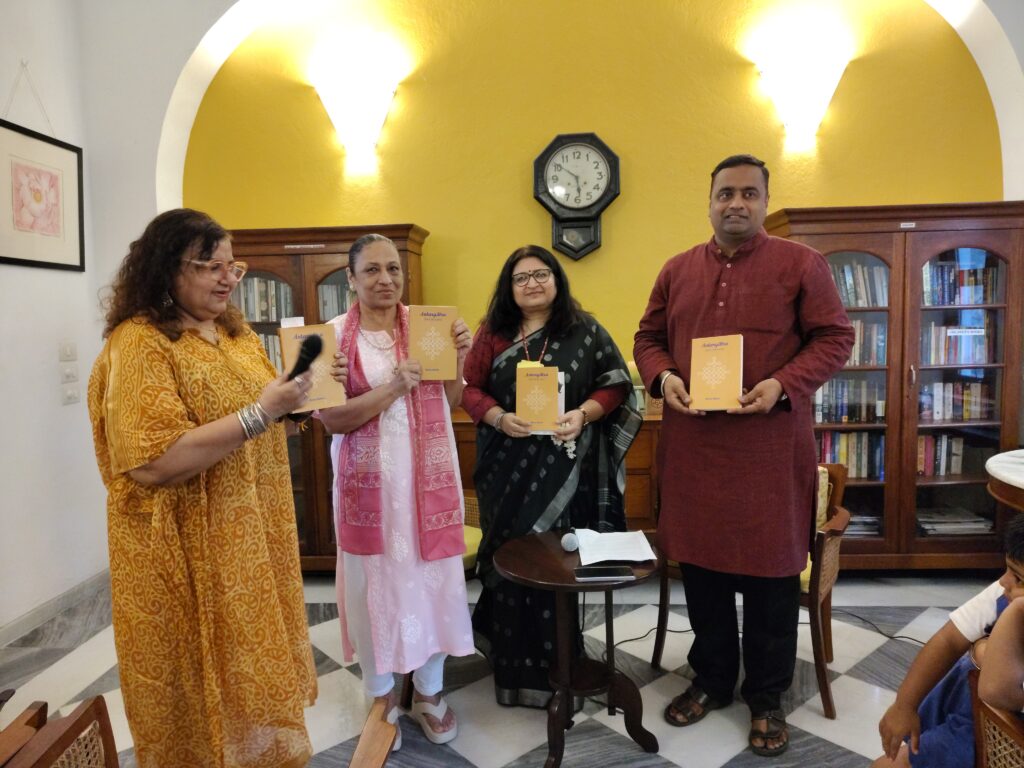
Engaging with Sri Aurobindo’s Thought
At the heart of the book is a deeply felt engagement with the thought and vision of Sri Aurobindo. Drawing primarily from Sri Aurobindo’s writings—especially India’s Rebirth, which is the book with which Yuvaan’s journey begins—the narrative brings to life key philosophical and political insights of one of India’s greatest modern sages. The voice of Yuvaan becomes the voice of a seeker—restless yet receptive, modern yet rooted, navigating the complexity of inherited knowledge systems, contemporary dilemmas, and the longing for spiritual meaning.
One of the defining strengths of Antaryatra is its ability to translate the abstractions of Sri Aurobindo’s thought into lived experience. The book introduces readers, particularly young readers, to complex ideas and ideals such as Sanatana Dharma, the Shakti of the nation, the meaning of true education, patriotism as spiritual duty, and nationalism not as chauvinism but as service to the Divine embedded in the nation ‘s soul. These are not presented through lectures but emerge organically as Yuvaan reflects on Sri Aurobindo ‘s words, engages in conversations, and contemplates his experiences.
The Structure of the Book
The structure of the book reflects its meditative character. Divided into 37 chapters, each segment serves as a vignette that brings out a particular insight, often prompted by a place visited, a person met, or a passage read. For example, in the early chapters, Yuvaan reads:
“Mother India is not a piece of earth; she is a Power, a Godhead … “
(Chapter 1: Jai Ma Gange! Jai Ma Bharati!, p.18)
This moment of epiphany becomes a cornerstone in his journey—not just geographically but spiritually. He begins to grasp that India is not merely a nation-state but a living consciousness, a force of Dharma in the evolution of humanity. Throughout the book, Dr. Mehra skillfully juxtaposes Sri Aurobindo’s profound assertions with Yuvaan’s inner questions.
This method is pedagogically effective, especially for younger audiences unfamiliar with metaphysical discourse. Instead of simplifying the complexity, she facilitates an experiential encounter with it. When Yuvaan reads, “The future belongs to the young… A brave, frank, clean-hearted, courageous and aspiring youth is the only foundation on which the future nation can be built.” (Chapter 3, p. 29), the words become a personal call, not just a historic quote.
The book’s prose is deliberate and serene, echoing the rhythm of spiritual reflection. While deeply philosophical in places, it maintains a tone of accessibility. The dialogues between Yuvaan and his friends Rishi, Aman, and Pranav are natural and well-crafted, providing a generational perspective on the search for identity, meaning, and rootedness. Their shared experiences—whether discussing India’s cultural richness, exploring ancient temples, or watching the Ganga Aarti — are occasions for revelation, not just tourism.
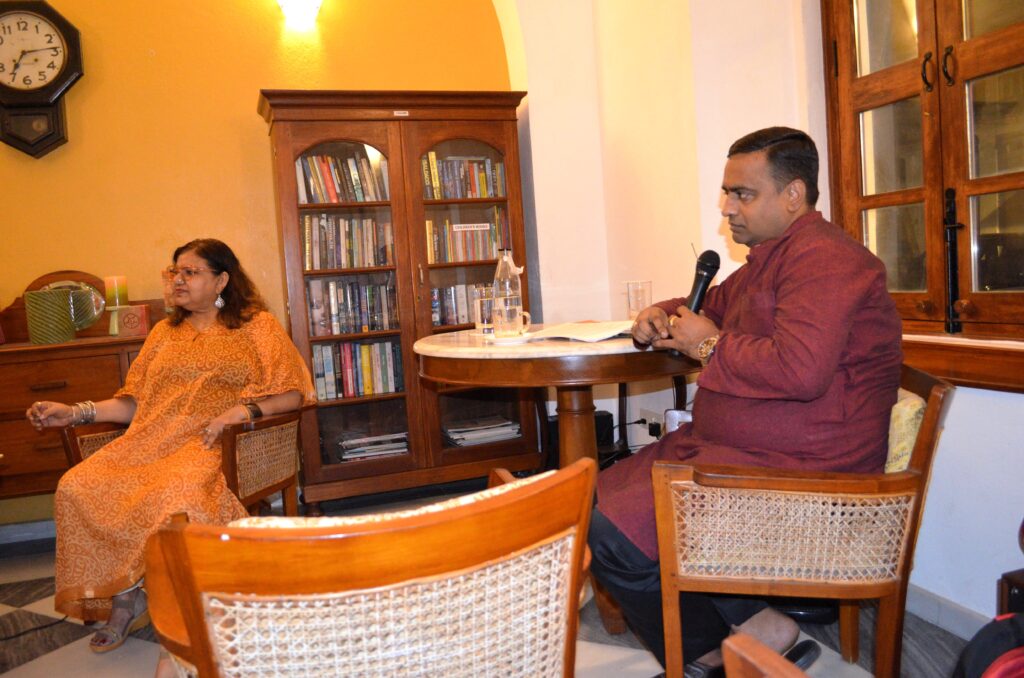
Some Illuminating Aspects
One particularly illuminating aspect of the book is its treatment of colonialism. In Chapter 5 (India Needed a Jolt), Sri Aurobindo’s nuanced view is introduced: “The mould had to be broken… England was best fitted… to do His work” (p. 40). This paradoxical view — that even colonial disruption was part of a Divine plan to break the decaying forms of Indian spirituality and prepare the ground for resurgence — challenges simplistic
historical binaries. It encourages the reader to think in civilizational and evolutionary terms, not merely political ones.
Another recurring theme is education. The critique of modern Indian education’s rootlessness and mimicry of Western models is strong, yet constructive. Yuvaan gradually learns that authentic education must inspire svadharma (one’s true purpose), not just career success. The discussions
on character-building, spiritual strength, and the integration of knowledge and values are especially pertinent in the current educational climate.
In the later chapters, particularly those set in Pondicherry and Auroville, the text takes on a more contemplative tone. Here, Yuvaan encounters silence—not just in the physical space of Matrimandir, but in his own consciousness.
“Yoga is change of consciousness.”
(Chapter 35, p. 263)
This line becomes a mantra for the concluding chapters. The emphasis shifts from ideas to presence, from seeking to being. Yuvaan is no longer only trying to understand India; he is beginning to live in tune with her soul.
Literary Narrative and National Consciousness
Dr. Mehra’s book is also a powerful affirmation of the potential of literary narrative to shape national consciousness. In times when India’s youth are overwhelmed by consumerist cultures and confused identities, Antaryatra stands out as a beacon. It invites reflection without dogma, pride without chauvinism, and spirituality without renunciation of life.
The book’s greatest contribution may well be its reclaiming of patriotism as a sacred act. In the words of Sri Aurobindo, quoted in the book:
“The spiritual force within not only creates the future but creates the materials for the future.”
(Chapter 4, p. 35)
This assertion encapsulates the book’s ethos: India’s rebirth depends not just on policies or technologies but on inner awakening—a collective antaryatra of her people.
To summarise, Antaryatra is a rare blend of spiritual insight, nationalistic fervor, and literary elegance. It is as much a call to rediscover India’s inner truths as it is an invitation for the reader to walk the path of inner awakening. For students, educators, spiritual seekers, and all those yearning to understand India, beyond headlines and hashtags, this book is not just a read, it is a journey. As Yuvaan discovers India, so does the reader, and in the process, both come closer to discovering themselves.

To purchase the book
E-mail: [email protected]
Price: Rs. 365/- (+ Rs. 50 Shipping within India)
GPay: Manju Bonke (9789409725)
Or Via bank transfer:
Bank name: Karur Vysya Bank, Pondicherry, IFSC code: KVBL0001230
#75&77 Ambalathadayar Madam Street
Account Name: Sri Aurobindo’s Action; Account No.: 1230155000000834

